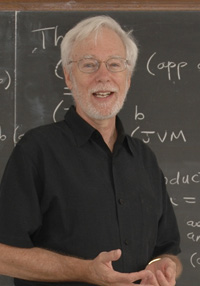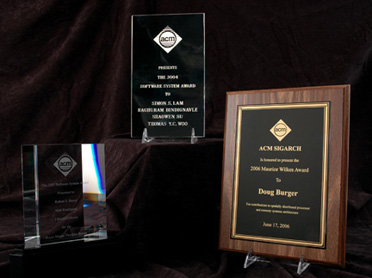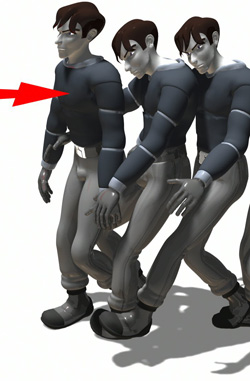SPRING 2007

Chairman J Strother Moore
Welcome to News@UTCS, the first e-newsletter from the University of Texas at
Austin Department of Computer Sciences (UTCS). News@UTCS is designed to
share our top news, events and progress with you several times a year.
2006 was a banner year for the department! From the Dell Foundation funding for a new building to innovative research, new academic initiatives and the launch of a new alumni program, we are moving on all fronts and fulfilling our mission of providing the ideas and work force for the future. Read on for news about recent developments.
A thriving economy is impossible without innovative computing. For example, economist Ray Perryman estimates that the strategic impact of the department is $8.7 billion per year. Whether the next wave is biotech or nanotech, entertainment or health care, the enabling technology is computing, and the core knowledge is derived in computer science research. Thus, we see our mission as crucial to the University, the region and the country.
We have accomplished much, yet much remains to be done. We believe the best is yet to come and we
invite you to learn about and be a part of our endeavors! Stay tuned, stay connected and let us know
what you think about the newsletter at
oea@cs.utexas.edu.
J Strother Moore
Chair, UTCS
$10M Gift from the Michael and Susan Dell Foundation
UTCS garnered a $10 million lead gift from the Michael & Susan Dell Foundation for the new computer science building on the UT Austin campus to be named “Dell Computer Science Hall.” The new facility will enable advances and breakthroughs in computing and its broad applications to improve the future across a number of industries and scientific fields.
The new building will be joined to the west end of Taylor Hall and extend south over the site currently occupied by a large chilling station. Together, Taylor Hall, the Applied Computational Engineering and Science (ACES) building, and Dell Computer Science Hall will provide – for the first time in decades -- a coherent home for computer science on campus, with state-of-the-art research and instructional labs, classrooms, meeting rooms for student organizations, all mingled with faculty offices and grad student space.
The Dell gift launches an extensive capital campaign for UTCS with a total funding goal of $132 million. The $132 million funding proposal goals are divided as follows:
- Professorships $5 million
- Research Leaves $10 million
- Research Administration Support $10 million
- New Faculty Summer Support $2 million
- Graduate Fellowships $22 million
- Honors Undergraduate Scholarships $5 million
- Special Undergraduate Programs $4 million
- New Building $67 million
- Renovation of Taylor $7 million
If you are interested in the capital campaign, please contact UTCS Chair, J Strother Moore at moore@cs.utexas.edu.
Major Department Awards and Recognition

Three awards won in 2005-2006
UTCS is pleased to note a number of significant and international
awards for achievements.
- 2007 National Academies Computer Science and Telecommunications Board, Fred Chang
- 2007 National Academy of Engineering, Simon Lam, J Moore
- 2007 IJCAI Computers and Thought Award, Peter Stone
- 2006 ACM SIGARCH Maurice Wilkes Award, Doug Burger
- 2006 SIAM Linear Algebra Prize, Inderjit Dhillon
- 2005 ACM Software System Award: Bob Boyer, Matt Kaufmann, J Moore
- 2004 ACM Software System Award, Simon Lam
- 2004 SIGCOMM Award, Simon Lam
- 2004 IEEE W. Wallace McDowell Award, Simon Lam
- 2003 ACM Grace Murray Hopper Award, Steve Keckler
- 1999 CADE Herbrand Award: Bob Boyer, J Moore
- 1998 ACM Kanellakis Award, Allen Emerson
Continually updated awards and recognition as well as press releases are available at UTCS Spotlights at http://oea.cs.utexas.edu/headlines.shtml.
Visions Lectures and Reception
UTCS hosted the annual Visions of Computing Lectures and Reception on November 9th. The event was held to recognize five faculty members and their work: Dr. Doug Burger, Dr. Inderjit Dhillon, Dr. Robert Boyer, Dr. Matt Kaufmann and Dr. J Strother Moore. Invitees included interdisciplinary faculty and students, related campus administrators, Littlefield Society and CS scholarship donors and Friends of Computer Sciences (FoCS) members. A full house gathered to hear each honoree give a lecture, followed by a congratulatory evening reception.New Faculty Members and Faculty Recruitment
UTCS faculty today boasts 47 Assistant, Associate, and Full Professors, up from around 30 just 10 years ago. This includes faculty in robotics, graphics and animation, computer vision, image recognition and retrieval, networking, and security, among others. New undergraduate programs, including the Pre-CS program to help control widely varying enrollments, the Elements of Computer Science to serve non-majors, the Turing Scholars Honors program, and the Digital Media certificate as part of the Bridging Disciplines program, round out the CS curriculum.
UTCS is pleased to welcome its most recently hired faculty members to the department. Keshav Pingali, the W. A. “Tex” Moncrief Jr. Chair in Distributed and Grid Computing (programming languages, high-performance computing, compilers), Kristen Grauman, Assistant Professor and recipient of the Clare Boothe Luce Professorship (computer vision, object recognition, content-based image retrieval), Dana Ballard, Professor (computational theories of the brain, computer vision), and William Press, Professor (computational biology and computational methods). Learn more about the new faculty and about all CS faculty.
UTCS is also recruiting a new faculty member for fall '07.
Research Spotlight: Computer Graphic Rendering, Okan Arikan

This image demonstrates a fast and accurate approximation
to the indirect illumination that bounces around the scene.
Computer graphics is traditionally defined as the science of creating
synthetic imagery, but it is so much more today. It includes many areas
such as rendering (modeling the way light propagates in a scene), animation,
physically-based modeling, surface modeling and graphics hardware. The
algorithms developed by computer graphics researchers enable training
simulations and scientific and architectural data visualization. Computer
graphics is also responsible for the great video games we play and the
synthetic characters and environments we see in movies. It is the ubiquitous
and visual nature of the field that motivates Okan Arikan to specialize
in computer graphics.

The figure demonstrates a synthesized
motion of a character being pushed.
Arikan joined the University of Texas in Fall 2005 as an assistant
professor. Before then, he was at University of California, Berkeley for his
Ph.D. Arikan's work in graphics started with creating fast proxy simulations
for efficiently visualizing large environments with many individual agents
making their own decisions - such as a computer game. His research then
focused on realistic ways of synthesizing motions for these agents (such as
a game character). This is an interesting and challenging problem, especially
if the character represents a human. The challenge stems from the fact that
people are very sensitive to how humans move, because observing motion and
interpreting minute body gestures is what humans have been doing for thousands of years.
During his Ph.D., Arikan was involved in the core problem of computer graphics: creating realistic images of synthetic environments. To facilitate his research, he authored an open source renderer that translates a scene description into visual imagery. His software is currently being used in industry as well as in academia. His contributions to rendering include efficient ways of computing the total amount of light arriving at a particular point and creating the realistic appearance of large scale explosions.
As graphics hardware and software evolves, we can process and create realistic images of very complex environments (as any recent Xbox/Playstation/Nintendo game proves). Unfortunately, great visual detail comes at the great cost of creating it. Arikan's current research interests include automatic methods for creating visual detail. He hopes to create tools for artists, and eventually for non-trained people, to efficiently create visual worlds and believable characters complete with the physical realism we expect from real-life.
Okan Arikan's research and related links
Career Fair and Brunch
The September 2006 College of Natural Sciences Career Fair and Friends of Computer Sciences (FoCS) Career Brunch launched a particularly lively year for industry recruiters and students. Both the Career Fair and the targeted FoCS Career Brunch were overflowing with attendees, energy and excitement as hiring connections and future opportunities unfolded. See what industry and students had to say.
First Bytes, a Residential Summer Computer Science Program for High School Girls
First Bytes, Version 5.0, a residential computer science program for young women, will be held from June 24 - June 30. The week of activities includes lab sessions, building robots, learning from UTCS current students, faculty, and alumni, plus fun activities like deconstructing computers, corporate field trips and visiting with women in the industry. If you're interested in participating in the program, contact Mary Esther Middleton, mem@cs.utexas.edu, / 512.471.9740. First Bytes web site.
The UTCS ACM Programming Team
The UTCS ACM Programming Team is competing in the ACM International Programming Contest in Tokyo in March. The UTCS team placed second in the regional contest and was invited to compete in the international contest that is sponsored by IBM.
FoCS Welcomes New Members
The UTCS Friends of Computer Sciences (FoCS) program exists to create and support mutually beneficial collaboration and recruiting opportunities between UTCS and industry. The FoCS program affords industry an opportunity to benefit from cutting-edge research activities, access to faculty and students and networking with other industry affiliates. UTCS thanks our longstanding members for their continued support and interest in our endeavors. UTCS also warmly welcomes new FoCS members: American Airlines, ConocoPhillips, Dell, Fortigo, Gravitant, NetQoS, RGM Advisors, Schlumberger and Surgient.
Through the boom and bust years, the FoCS program has remained strong with an impressive roster of members. View a list of current members, benefits and the membership application.
UTCS Press Desk
Department endeavors were popular in both local and national press this year. Along with campus publications, local papers The Austin American Statesman and The Austin Business Journal ran multiple stories on our work as well as our student and faculty talent. National publications Forbes, Business Week, and The Wall Street Journal also reported on some of our top activities. Continually updated press activity is posted on our “Action Bytes” bulletin board in Taylor Hall as well as UTCS spotlights.
Alumni Program Launch
If you're an alumnus, you might have fond (or at least intense!) memories of the early days of your career — the first time you saw a cool algorithm or came to understand how an operating system really works, or a professor or staff member who made a difference in your life. But don't let your memories define the department today! It is a very different place than it was even five years ago.
UTCS is planning the launch of an alumni program in the near future. An alumni steering committee will convene in 2007 to plan the benefits and connections that alumni would like to see implemented. In the meantime, CS alumni are encouraged to keep their contact information updated by emailing info@alumni.cs.utexas.edu. You may also apply for a free, lifetime @alumni.cs.utexas.edu email account and a cross link to your personal or business web page from the CS alumni site.
If you are interested in participating in the planning process of the alumni program launch, please email info@alumni.cs.utexas.edu
UTCS Staff News
- New Employees:
- Angela Farris – Purchasing
- Theresa Lopez – Purchasing
- Amy Manning – Accounting
- Marcus Marler – Web Designer
- Cindy Schindler – Office of External Affairs/Events
- Tiffany Grady – Academic Initiatives and Outreach
- Winner of the UTCS Staff Excellence Award:
- Yadi Colon – Undergraduate Advising Office
Major events and deadlines
January 2007
- 26 –TGIF
- *Faculty Forum Lunch, Wednesdays @ Noon
- *Grad Tea Time, Wednesdays, 3:30
- Register for Spring Career Fair
- 1 – College of Natural Sciences Spring Career Fair
- *14 – Scholarship Lunch
- 23 – TGIF
- *Faculty Forum Lunch, Wednesdays @ Noon
- *Grad Tea Time, Wednesdays, 3:30
- 3 – Explore UT, 11 a.m.-4:40 p.m.
- 23-24 – GradFest
- *Faculty Forum Lunch, Wednesdays @ Noon
- *Grad Tea Time, Wednesdays, 3:30
- 6 – First Bytes Camp Applications due
- 13 – CS Kinetoscopic Wonderment Film Festival Screening
- 20 - College of Natural Sciences Research Forum
- 27 – TGIF
- 30 - TRIPS Celebration
- *Faculty Forum Lunch, Wednesdays @ Noon
- *Grad Tea Time, Wednesdays, 3:30
- *18 – Commencement Celebration Lunch, “C2”
- *Faculty Forum Lunch, Wednesdays @ Noon *Grad Tea Time, Wednesdays, 3:30
- 31 – Scholarship application deadline
- 24 -30 – First Bytes Camp
- *Faculty Forum Lunch, Wednesdays @ Noon

1 University Station C0500 | Austin, TX 78712-0233 | oea@cs.utexas.edu